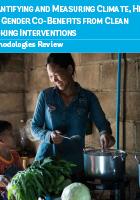Publications
Improving global cooking conditions is a primary focus of Sustainable Development Goal (SDG) 7, which aims to “ensure access to affordable, reliable, sustainable, and modern energy for all.” Compared to other SDG 7 targets, however, there has been little progress in expanding access to modern cooking and heating technologies. Nearly 3 billion people still lack modern cooking and heating resources.
Not only is this detrimental to them, it compromises the achievement of other SDGs (ESMAP 2019). To increase access to efficient, clean cooking and heating (ECCH) solutions on a large scale, an estimated US4.4 billion dollars is needed annually (Angelou et al. 2013). Innovative ways for bridging this investment gap are needed if SDG 7 is to be achieved.
The World Bank has used results-based financing (RBF) widely in the health and climate impact sector. Borrowing from this experience, the World Bank works to support approaches in which impact-driven funds could be deployed to pay for verified climate, health, and gender impacts from ECCH interventions.
If such funds could be unlocked, they could serve as an innovative way to: (i) attract other funds that target public good benefits for climate, health, and gender; (ii) develop the market for ECCH by catalyzing private investment, innovation, and risk taking; and (iii), over time, mainstream approaches to quantify the benefits of ECCH into national policies and budgetary allocations. This type of RBF approach builds on recent progress in developing methodologies to measure health, gender, and expanded climate (black carbon) benefits.
Quantifying and Measuring Climate, Health and Gender Co-Benefits from Clean Cooking Interventions: Methodologies Review (English). Washington, D.C.: World Bank Group. Link to Report:
Attribution: Energy Sector Management Assistance Program (ESMAP). 2020. Quantifying and Measuring Climate, Health, and Gender Co-Benefits from Clean Cooking Interventions: Methodologies Review. Washington, DC: World Bank.
Link to Report on World Bank Documents and Reports:




